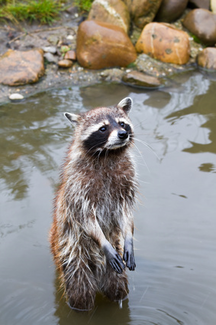
Canine Leptospirosis
As the weather becomes milder and the wildlife become more active, the risk of Leptospirosis increases.
Leptospirosis is a fatal disease of dogs caused by bacteria that attack their kidneys and liver. The organism is carried by infected wildlife (skunks, raccoons, foxes, deer, squirrels and other rodents) that shed the bacteria into the environment when they urinate. The organism thrives and multiplies in stagnant water. Culverts, ditches, puddles, ponds, swamps, slow moving streams and even wet grass become a source of infection to our dogs. Our canine friends acquire the infection from contact or ingestion of contaminated water, soil, vegetation and in some cases, from licking their wet feet.
Infected dogs become extremely sick within 4 to 12 days of exposure to the Leptospira bacteria. Typical clinical signs in dogs include vomiting, fever, generalized muscle and back pain, lethargy, loss of appetite and dehydration. As the disease progresses, patients show signs of kidney and liver failure, bleeding disorders and eventual death. Early diagnosis and treatment are essential to increasing the chances of survival in dogs.
Preventing exposure of our dogs to the organism is virtually impossible so immunization is the key to keeping them healthy. There are several efficacious vaccines available today which provide optimum protection against the most common strains of Leptospirosis. The vaccine delivers 12 months of protection so annual and timely re-vaccination is necessary to ensure effective, uninterrupted protection for your dog. This in turn will help to protect your whole family from serious health risks as the Leptospira bacteria can also infect humans. Check your dog’s vaccination certificate to see if he/she is inoculated against Leptospirosis. If your pet is not vaccinated against this life-threatening disease, call us immediately so we can discuss an immunization plan.
Please do not confuse Leptospirosis with Lyme disease which is transmitted by ticks.
Please click here for more information about Leptospirosis.
As the weather becomes milder and the wildlife become more active, the risk of Leptospirosis increases.
Leptospirosis is a fatal disease of dogs caused by bacteria that attack their kidneys and liver. The organism is carried by infected wildlife (skunks, raccoons, foxes, deer, squirrels and other rodents) that shed the bacteria into the environment when they urinate. The organism thrives and multiplies in stagnant water. Culverts, ditches, puddles, ponds, swamps, slow moving streams and even wet grass become a source of infection to our dogs. Our canine friends acquire the infection from contact or ingestion of contaminated water, soil, vegetation and in some cases, from licking their wet feet.
Infected dogs become extremely sick within 4 to 12 days of exposure to the Leptospira bacteria. Typical clinical signs in dogs include vomiting, fever, generalized muscle and back pain, lethargy, loss of appetite and dehydration. As the disease progresses, patients show signs of kidney and liver failure, bleeding disorders and eventual death. Early diagnosis and treatment are essential to increasing the chances of survival in dogs.
Preventing exposure of our dogs to the organism is virtually impossible so immunization is the key to keeping them healthy. There are several efficacious vaccines available today which provide optimum protection against the most common strains of Leptospirosis. The vaccine delivers 12 months of protection so annual and timely re-vaccination is necessary to ensure effective, uninterrupted protection for your dog. This in turn will help to protect your whole family from serious health risks as the Leptospira bacteria can also infect humans. Check your dog’s vaccination certificate to see if he/she is inoculated against Leptospirosis. If your pet is not vaccinated against this life-threatening disease, call us immediately so we can discuss an immunization plan.
Please do not confuse Leptospirosis with Lyme disease which is transmitted by ticks.
Please click here for more information about Leptospirosis.